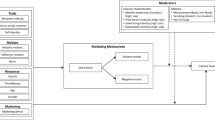Abstract
Building on past emotional trade-off difficulty and construal level research, we investigate the conditions under which consumers engage in avoidant coping behavior to reduce negative emotions that arise from trading off valued attributes (e.g., quality and price). Results from three studies offer evidence that an abstract (vs. concrete) mindset systematically decreases avoidant coping behavior (e.g., the selection of a status quo option) by reducing the intensity of the negative emotion consumers experience. This effect replicates across construal level manipulations and product categories. Thus, in addition to the harmful effects of negative emotions and coping behavior on consumer choice identified in past research, we find that an abstract (vs. concrete) mindset can help consumers make better (i.e., more normative) choices. Together, these findings have implications for marketers of new or unfamiliar products as well as products that are not incumbents or category leaders (i.e., status quo options) when consumers face difficult trade-offs.
Similar content being viewed by others
References
Anderson, C. J. (2003). The psychology of doing nothing: forms of decision avoidance result from reason and emotion. Psychological Bulletin, 129(1), 139–167.
Bettman, J. R., Luce, M. F., & Payne, J. W. (1998). Constructive consumer choice processes. Journal of Consumer Research, 25(3), 187–217.
Broniarczyk, S. M., & Griffin, J. (2014). Decision difficulty in the age of consumer empowerment. Journal of Consumer Psychology, 24(4), 608–625.
Brügger, A., Dessai, S., Devine-Wright, P., Morton, T. A., & Pidgeon, N. F. (2015). Psychological responses to the proximity of climate change. Nature Climate Change, 5(12), 1031–1037.
Cho, E. K., Khan, U., & Dhar, R. (2013). Comparing apples to apples or apples to oranges: the role of mental representation in choice difficulty. Journal of Marketing Research, 50(4), 505–516.
Drolet, A., & Luce, M. F. (2004). The rationalizing effects of cognitive load on emotion-based trade-off avoidance. Journal of Consumer Research, 31(1), 63–77.
Duhacheck, A. (2005). Coping: a multidimensional, hierarchical framework of responses to stressful consumption episodes. Journal of Consumer Research, 32(1), 41–53.
Fujita, K., Trope, Y., Liberman, N., & Levin-Sagi, M. (2006). Construal levels and self-control. Journal of Personality and Social Psychology, 90(3), 351–367.
Khan, U., Zhu, M., & Kalra, A. (2011). When trade-offs matter: the effect of choice construal on context effects. Journal of Marketing Research, 48(1), 62–71.
Lazarus, R. S. (1991). Progress on a cognitive-motivational-relational theory of emotion. The American Psychologist, 46(8), 819–834.
Liberman, N., Trope, Y., McCrea, S. M., & Sherman, S. J. (2007). The effect of level of construal on the temporal distance of activity enactment. Journal of Experimental Social Psychology, 43(1), 143–149.
Luce, M. F. (1998). Choosing to avoid: coping with negatively emotion-laden consumer decisions. Journal of Consumer Research, 24(4), 409–433.
Luce, M. F. (2005). Decision making as coping. Health Psychology, 24(4), S23–S28.
Luce, M. F., Bettman, J. R., & Payne, J. W. (1997). Choice processing in emotionally difficult decisions. Journal of Experimental Psychology. Learning, Memory, and Cognition, 23(2), 384–405.
Luce, M. F., Payne, J. W., & Bettman, J. R. (1999). Emotional trade-off difficulty and choice. Journal of Marketing Research, 36(2), 143–159.
Malkoc, S. A., Zauberman, G., & Ulu, C. (2005). Consuming now or later? The interactive effect of timing and attribute alignability. Psychological Science, 16(5), 411–417.
Newell, B. R., McDonald, R. I., Brewer, M., & Hayes, B. K. (2014). The psychology of environmental decisions. Annual Review of Environment and Resources, 39, 443–467.
Thomas, M., & Tsai, C. I. (2012). Psychological distance and subjective experience: how distancing reduces the feeling of difficulty. Journal of Consumer Research, 39(2), 324–340.
Thompson, D. V., Hamilton, R. W., & Petrova, P. K. (2009). When mental simulation hinders behavior: the effects of process-oriented thinking on decision difficulty and performance. Journal of Consumer Research, 36(4), 562–574.
Trope, Y., & Liberman, N. (2010). Construal-level theory of psychological distance. Psychological Review, 117(2), 440–463.
Vallacher, R. R., & Wegner, D. M. (1989). Levels of personal agency: individual variation in action identification. Journal of Personality and Social Psychology, 57(4), 660–671.
Van Boven, L., Kane, J., McGraw, A. P., & Dale, J. (2010). Feeling close: emotional intensity reduces perceived psychological distance. Journal of Personality and Social Psychology, 98(6), 872–885.
Williams, L. E., & Bargh, J. A. (2008). Keeping one’s distance: the influence of spatial distance cues on affect and evaluation. Psychological Science, 19(3), 302–308.
Williams, L. E., Stein, R., & Galguera, L. (2014). The distinct affective consequences of psychological distance and construal level. Journal of Consumer Research, 40(6), 1123–1138.
Xu, J., Jiang, Z., & Dhar, R. (2013). Mental representation and perceived similarity: how abstract mindset aids choice from large assortments. Journal of Marketing Research, 50(4), 548–559.
Author information
Authors and Affiliations
Corresponding author
Rights and permissions
About this article
Cite this article
Alexander, D.L., Stadler Blank, A. Besting the status quo: the effect of abstract versus concrete mindsets on emotional trade-off difficulty and avoidant coping behavior. Mark Lett 29, 351–362 (2018). https://doi.org/10.1007/s11002-018-9463-8
Published:
Issue Date:
DOI: https://doi.org/10.1007/s11002-018-9463-8




